Starting August 1, 2025, Bank of Maldives (BML) will no longer process Indian Rupee (INR) transactions of INR 500 and above, marking a significant shift in the banking relationship between the Maldives and India. This policy change comes at a time when bilateral financial cooperation has been a cornerstone of economic ties between the two nations.
Table of Contents
Understanding the New BML Policy
The decision affects thousands of customers who regularly conduct business and personal transactions in Indian Rupees. Bank of Maldives, being the largest commercial bank in the Maldives, serves as a crucial financial bridge between the two countries.
Key Policy Details
| Aspect | Details |
|---|---|
| Effective Date | August 1, 2025 |
| Transaction Limit | INR 500 and above (discontinued) |
| Bank | Bank of Maldives (BML) |
| Affected Services | All INR transactions above threshold |
| Alternative Currencies | USD, EUR, GBP continue as normal |
Background: India-Maldives Financial Cooperation
The timing of this policy change is particularly significant given the recent developments in India-Maldives financial relations. In November 2024, India and Maldives signed a pact for cross-border transactions in local currencies, with the MoU signed by Shaktikanta Das, governor of RBI, and Ahmed Munawar, governor of Maldives Monetary Authority.
This agreement was designed to facilitate smoother trade and investment flows between the two countries by allowing transactions in Indian Rupees and Maldivian Rufiyaa.

Recent Banking Challenges
BML faced significant challenges in August 2024 when it suspended foreign transactions on its debit cards, causing widespread panic for Maldivians living abroad. The bank has since worked to restore services and improve its international banking capabilities.
For more insights on India-Maldives relations, check our International Relations section.
Impact on Various Stakeholders
Tourism and Business Sectors
The Maldives tourism industry, heavily dependent on Indian visitors, may face payment processing challenges. Indian tourists and businesses operating between the two countries will need to adapt to alternative payment methods.
Remittances and Personal Transfers
Indian expatriates working in the Maldives and Maldivians with business interests in India will be most affected by this policy change. Currently, BML allows sending money to different currency accounts, including Indian Rupee accounts, with funds remitted in USD and credited to beneficiaries in INR at the discretion of the beneficiary bank.
Exchange Rate Implications
With the current Maldivian Rufiyaa to Indian Rupee rate at approximately 1 MVR = ₹5.5341, customers will need to rely on USD conversions, potentially increasing transaction costs.
For comprehensive coverage of banking sector developments, visit our Finance News section.

Alternative Banking Solutions
Other Financial Institutions
Customers may need to explore services offered by other banks operating in the Maldives, including international banks and local competitors that continue to process INR transactions.
Digital Payment Platforms
The rise of digital payment solutions and cryptocurrency exchanges may provide alternative channels for India-Maldives financial transactions.
State Bank of India Branch
SBI Maldives continues to accept cash in multiple currencies including MVR, USD, EUR, GBP, AED, AUD, SGD, and JPY from its customers, potentially offering an alternative for INR-related services.
Broader Economic Implications
This policy shift occurs against the backdrop of evolving India-Maldives economic relations. The decision may reflect broader monetary policy considerations, compliance requirements, or strategic repositioning by BML in the international banking landscape.
Impact on Trade Relations
The restriction could affect bilateral trade volumes and payment mechanisms between Indian and Maldivian businesses, potentially requiring new financial frameworks for cross-border commerce.
Stay updated with the latest developments in South Asian banking policies on our Regional Economics section.
What Customers Should Do
Existing BML customers with regular INR transactions should:
- Contact BML customer service for clarification on alternative options
- Explore USD-based transaction methods
- Consider opening accounts with other banks offering INR services
- Review and adjust international payment strategies
For more banking tips and financial guidance, explore our Personal Finance section.
FAQs
Q1: Why is BML stopping Indian Rupee transactions above INR 500?
A1: While BML hasn’t publicly detailed the specific reasons, this policy change likely reflects regulatory compliance requirements, operational efficiency considerations, or strategic repositioning. The bank continues to process transactions in other major currencies like USD, EUR, and GBP normally.
Q2: What alternatives do customers have for India-Maldives money transfers?
A2: Customers can use USD-based transfers through BML, explore services from other banks like SBI Maldives that accept multiple currencies, or consider digital payment platforms. BML still allows sending funds in USD to Indian Rupee accounts, with conversion handled by the beneficiary bank.








